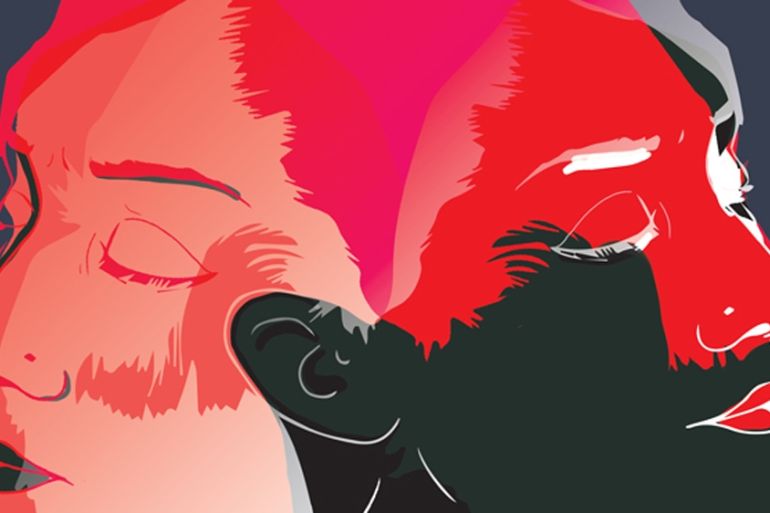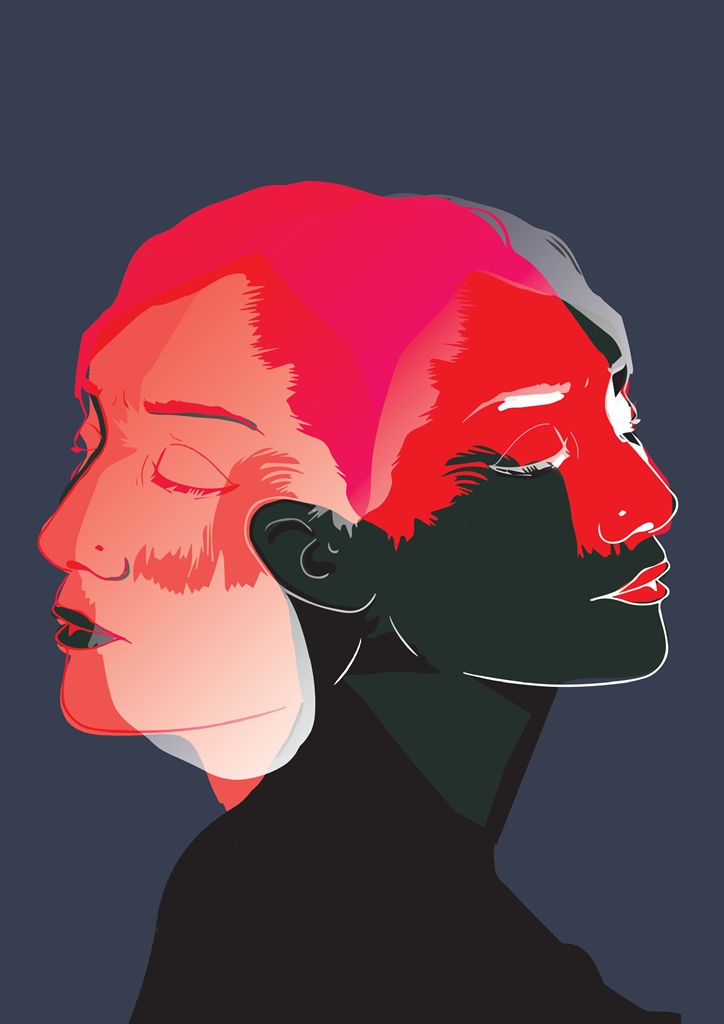
The sad – and the sadder – me
The story of one woman’s struggle with bipolar disorder.
Have you ever felt like you’re somebody else, as though you don’t belong in your own body?
I have. In fact, there have been many times when I have felt as though I’ve woken from a strange dream, with no clue where I am. Except I wasn’t asleep.
Keep reading
list of 4 itemsA year of survival in the Turkey-Syria earthquake zoneThis article will be opened in a new browser window
‘If I die, I die’: The allure of Pakistan’s death-trap route to Europe
Lojay, the preacher’s son minting romantic anthems from stripper therapy
My episodes – especially the bad ones when I haven’t taken my medication – are similar to blackouts. It is like somebody else has possessed my body. My memories of what has happened during that time are engulfed in a kind of dream-like fog.
They are sometimes preceded by uncontrollable crying and extreme anger; they might be triggered by a specific incident. But at other times, they just creep up on me, unannounced.
That is bipolarity. And I believe it is a combination of nature and nurture. Let me explain why.
I had a difficult childhood, although I have blocked out many of the worst moments so that they, too, now seem like just a bad dream.
My mum was 18 when she gave birth to me. Her own mother had sent her to live with relatives when she was five, and had little time or tolerance for her or her children.
My parents are divorced, and as a child I was constantly moving. I was always the new girl in school; the girl who wasn’t around long enough to have friends.
As a single mother, my mum had to work to provide for us. So I was often left with neighbours. There was one who took particular joy in abusing me: hitting me, threatening me with knives and warning: “If you tell your mum, I will kill you.”
As a child, you believe everything that happens is your fault. You tell yourself that you deserve the beatings because you are bad. What other explanation could there be?
Al Jazeera Correspondent : Mental illness : Breaking the Silence
And for me, there was no place to seek respite or reassurance. Because, for as long as I can remember, my mother’s moods have swung like a pendulum from complete ecstasy to utter despair – with little in between.
One minute she would be riding high on the latest solution to all her woes – whether some religious sect that offered her false hope in exchange for what little money she had, witchcraft, self-help books or the neuro-linguistic recordings that promised to make her wealthy and successful.
The next, she would be miserable: nobody loved, liked or appreciated her enough. In fact, everyone was against her.
Put simply, my mum was unstable – and she transferred that instability to me.

I spent only a few years living with her as I was mostly raised by my father’s parents. But we had a great relationship until I was about 15. We were equals. We were best friends.
And the older I grew, the more I realised that she had never really had a shot at a childhood herself. Nor had she been able to grow up. I had become, in a sense, my mother’s mother.
That sometimes meant providing for her – using my lunch money or the salary I earned from summer jobs to buy her the things she needed. It often meant giving her advice and support. When she was homeless, I would appeal to my grandmother to let her stay with us. When her abusive second husband beat her, I would place myself between them to protect her.
Then, when I was 17, she disappeared.
She’d recently met a new man on the street. She spent more and more time with him, becoming more and more like him – as she was prone to do whenever somebody new came into her life.
Every day, I would visit her to check that she was okay. One day, she wasn’t there. “You need to find her,” the new man urged me. “She wasn’t even wearing shoes,” he added.
I looked all over the city. I imagined her lying dead somewhere, her organs being sold on the black market even as I searched for her. And the fear I felt became tinged with a growing sense of anger. I had been abandoned by a mother who had, I believed, chosen victimisation – at my expense, as well as her own.
I realised then that she had stolen my childhood from me, just as her mother had taken hers. It wasn’t intentional. She was trying to fix her own trauma. But in the process of fixing herself, she had broken me and my siblings.
I swore I wouldn’t be like her – and it dawned on me just how much I was.
It was there in everything from my hands to my mood swings.
She eventually returned, several months later, but in many ways our relationship is much the same today. I will call her and for the first 45 minutes she will talk about herself. When I tell her I have to go, she’ll ask how I’m doing as an afterthought. If I draw attention to this, I simply add fuel to the fire of her self-loathing.
But my own issues had become obvious before my mum’s disappearance. I was often angry and aggressive. My grandmother started taking me to a psychiatrist when I was 12.
I saw him for 10 years. But it was when I turned 18 that the psychotropic parade began. I took Ambien, Ativan, Bupropion, Cymbalta, Effexor, Lamictal, Lexapro, Paxil, Prozac – and those are just the medications I can remember.
Despite my psychiatrist’s best efforts, the therapy wasn’t working and I started to abuse the prescriptions. I was an irresponsible teenager with access to strong, hallucinogenic medications. So, I mixed them with alcohol and partied.
I seemingly had fun, I met interesting people, I owned the town.
And then, all of a sudden, or so it seemed, the party was over.
I simply couldn’t conceal the pain anymore.
I stopped eating. I fell sick. And I tried to kill myself – many times.
I was broken.
I would sleep with razor blades under my pillow. They became my go-to tool of self-harm whenever the panic or despair set in. The physical pain was the only thing that seemed to ease the emotional hurt.
One suicide attempt stands out from the others.
A former boyfriend had invited me to see his band. He was my first love, and our break-up had left me devastated. We got talking, reminiscing about the past and catching up on the present. But it soon turned into an argument.
What happened next is a bit foggy. I remember running from the room, I remember the balcony, and then I remember a tall man with piercings and spiky blue hair grabbing me and pulling me down from it. I’d never seen him before, but he saved my life.
Then we sat and cried together, as he told me the story of a friend who’d killed himself.
The next day, I decided to go sober.
I returned to therapy and, for two years, I did well.
But it didn’t last.
One day I would be sad, and the next I would be very sad. I lived with degrees of sadness and nothing else. But I didn’t even have a name for what I was experiencing.
I blamed it on my childhood, on my mother, on the father I rarely saw, on the ex-boyfriends who hadn’t loved me enough, on the grandmother who pushed me too hard. It was me against the world.
Eventually, a therapist ran some tests. They confirmed that I was bipolar, but I knew that couldn’t be it. I imagined ‘bipolar’ to be an umbrella term for everything from depression to anxiety. And, well, isn’t everybody that these days?
I quit therapy, moved country.
I started a new relationship, with a man who stuck by me, no matter how angry or sad I became or how many times I threatened to leave him or kill myself. His mother had struggled with depression, so he understood it. He made me promise to get help – and I did.
My new doctor diagnosed me. “You are bipolar depressed,” she told me. “You go from sad to very sad.”
My demon finally had a name; a name that made sense to me, that reflected my reality.
It took a while to find the right balance of medications. But even in the right dose and combination, nobody ever likes taking them. At worst, they would make me vomit all the time. At best, I just feel slightly tipsy.
And the thing with bipolarity is that as soon as you feel better, you believe you can take on the world – and who needs medication for that?
But the only real long-term solution is consistency: taking your medication, seeing your therapist, avoiding those things, like alcohol, that make you prone to depression, and searching out the things that make you feel better.
Of course all of this would be much easier if we didn’t feel a need to shroud it in secrecy.
It’s always difficult to talk about mental illness – especially our own. But, in recent years, more and more people have been speaking out. I just hope that one day we’ll be able to talk about going to the psychiatrist in the same way we talk about seeing the dentist. If we can get our cavities fixed, surely we can also try to heal ourselves.
This article first appeared in the July issue of the Al Jazeera Magazine.